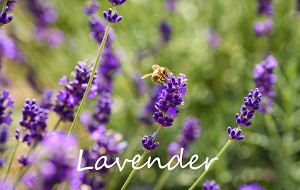Written by Angeline A. De Leon, Staff Writer. A study of 92 participating healthy adults, demonstrated the effectiveness of lavender aromatherapy in significantly improving post –stress memory and processing speed.
 Popularized as a therapeutic technique for stress reduction, aromatherapy has more recently been studied for its beneficial effects on mood and cognitive functioning. Studies indicate that the individual components of specific aromas, through their interactions with different olfactory receptors in the nasal cavity, can uniquely influence neural activity to produce stress-reducing effects (operation through pharmacologic mechanisms) 1,2. It is also possible, however, that aroma-related benefits may be due to potential subjective expectations about odor quality (involving an expectancy-related mechanism) 3,4, or may simply represent reactivity to the pleasant quality associated with an odor (involving a hedonically-driven mechanism). A 2016 study published in the Journal of Alternative and Complementary Medicine investigated the different pathways underlying the stress-reducing effects of aroma by looking at the impact of lavender aroma on cognitive and physiological function following acute stress exposure.
Popularized as a therapeutic technique for stress reduction, aromatherapy has more recently been studied for its beneficial effects on mood and cognitive functioning. Studies indicate that the individual components of specific aromas, through their interactions with different olfactory receptors in the nasal cavity, can uniquely influence neural activity to produce stress-reducing effects (operation through pharmacologic mechanisms) 1,2. It is also possible, however, that aroma-related benefits may be due to potential subjective expectations about odor quality (involving an expectancy-related mechanism) 3,4, or may simply represent reactivity to the pleasant quality associated with an odor (involving a hedonically-driven mechanism). A 2016 study published in the Journal of Alternative and Complementary Medicine investigated the different pathways underlying the stress-reducing effects of aroma by looking at the impact of lavender aroma on cognitive and physiological function following acute stress exposure.
A total of 92 healthy adults (ages 50-85) participated in a single-blind, randomized-controlled trial. At baseline and following stress exposure, participants completed a battery of cognitive tests (measuring executive functions such as working memory), a series of self-report measures (assessing expected effects of aromatherapy on stress, subjective stress, and aroma pleasantness and intensity), and physiologic assessments (based on respiration rate and saliva samples). For the stress battery (involving physical, emotional and mental stressors), participants were randomly assigned to one of three groups: the treatment group received one drop of lavender essential oil diluted in 15 mL of grapeseed oil (n = 31); the detectable placebo group received one teaspoon of virgin coconut oil diluted in 15 mL of grapeseed oil (n = 31); and the undetectable placebo group received distilled water (n = 30). Within each group, half the participants were primed to expect a powerful stress-reducing aroma, while the other half received no prime.
Main findings of the study showed that the lavender group, but not the placebo groups, had significantly improved performance on the working memory task following stress exposure, showing a 1-point overall increase in score [F(2,86) = 5.41; p = 0.006]. Regardless of aroma group, higher expectancy caused by positive priming also significantly enhanced post-stress performance on the processing speed task [F(1,87) = 8.31; p = 0.005]. Additional evidence pointed to a detectable effect of aroma hedonics (both pleasantness and intensity) on lavender’s efficacy in enhancing working memory and physiologic functions (respiration rate, stress biomarker count).
Results from the study demonstrate that the stress-reducing effects associated with aroma exposure are complex and arise from various mechanisms, involving aroma-specific pharmacologic properties, aroma hedonic properties, as well as participant expectations. Overall evidence supports the use of aromatherapy in effectively protecting cognitive and physiological functions following acute stress. Future investigations would benefit from broadening outcome measures to include additional biomarkers and more specific tests of cognitive and affective functioning. The study of alternative essential oils is also warranted.
Source: Chamine I, Oken BS. Aroma effects on physiologic and cognitive function following acute stress: A mechanism investigation. Journal of alternative and complementary medicine. 2016; 0(0): 1-9.
© Mary Ann Liebert, Inc
Posted April 24, 2017.
Angeline A. De Leon, M.A., graduated from the University of Illinois at Urbana-Champaign in 2010, completing a bachelor’s degree in psychology, with a concentration in neuroscience. She received her master’s degree from The Ohio State University in 2013, where she studied clinical neuroscience within an integrative health program.
References:
- Elisabetsky E, Marschner J, Onofre Souza D. Effects of linalool on glutamatergic system in the rat cerebral cortex. Neurochemical research. 1995;20(4):461-465.
- Cavanagh H, Wilkinson J. Biological activities of lavender essential oil. Phytotherapy Research. 2002;16(4):301-308.
- Kiecolt-Glaser JK, Graham JE, Malarkey WB, Porter K, Lemeshow S, Glaser R. Olfactory influences on mood and autonomic, endocrine, and immune function. Psychoneuroendocrinology. 2008;33(3):328-339.
- Howard S, Hughes BM. Expectancies, not aroma, explain impact of lavender aromatherapy on psychophysiological indices of relaxation in young healthy women. British journal of health psychology. 2008;13(4):603-617.
